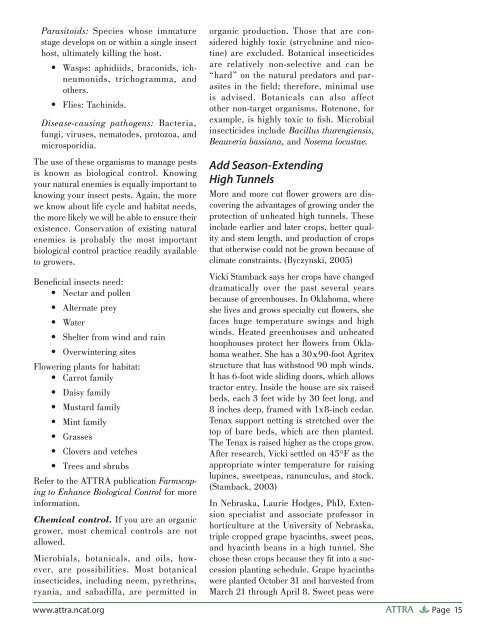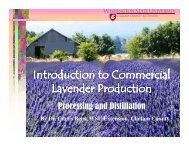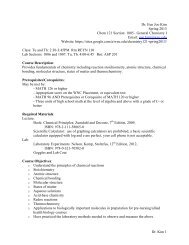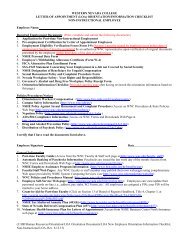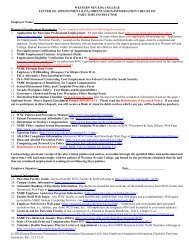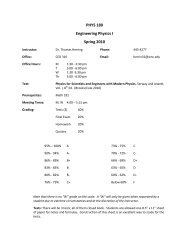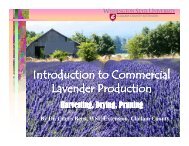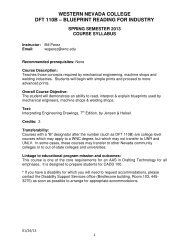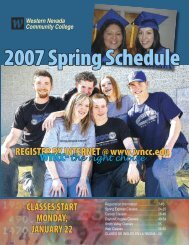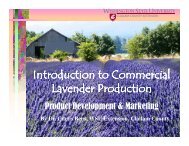Specialty Cut Flower Production and Marketing - UC Agriculture and ...
Specialty Cut Flower Production and Marketing - UC Agriculture and ...
Specialty Cut Flower Production and Marketing - UC Agriculture and ...
You also want an ePaper? Increase the reach of your titles
YUMPU automatically turns print PDFs into web optimized ePapers that Google loves.
Parasitoids: Species whose immaturestage develops on or within a single insecthost, ultimately killing the host.• Wasps: aphidiids, braconids, ichneumonids,trichogramma, <strong>and</strong>others.• Flies: Tachinids.Disease-causing pathogens: Bacteria,fungi, viruses, nematodes, protozoa, <strong>and</strong>microsporidia.The use of these organisms to manage pestsis known as biological control. Knowingyour natural enemies is equally important toknowing your insect pests. Again, the morewe know about life cycle <strong>and</strong> habitat needs,the more likely we will be able to ensure theirexistence. Conservation of existing naturalenemies is probably the most importantbiological control practice readily availableto growers.Benefi cial insects need:• Nectar <strong>and</strong> pollen• Alternate prey• Water• Shelter from wind <strong>and</strong> rain• Overwintering sites<strong>Flower</strong>ing plants for habitat:• Carrot family• Daisy family• Mustard family• Mint family• Grasses• Clovers <strong>and</strong> vetches• Trees <strong>and</strong> shrubsRefer to the ATTRA publication Farmscapingto Enhance Biological Control for moreinformation.Chemical control. If you are an organicgrower, most chemical controls are notallowed.Microbials, botanicals, <strong>and</strong> oils, however,are possibilities. Most botanicalinsecticides, including neem, pyrethrins,ryania, <strong>and</strong> sabadilla, are permitted inwww.attra.ncat.orgorganic production. Those that are consideredhighly toxic (strychnine <strong>and</strong> nicotine)are excluded. Botanical insecticidesare relatively non-selective <strong>and</strong> can be“hard” on the natural predators <strong>and</strong> parasitesin the fi eld; therefore, minimal useis advised. Botanicals can also affectother non-target organisms. Rotenone, forexample, is highly toxic to fi sh. Microbialinsecticides include Bacillus thurengiensis,Beauveria bassiana, <strong>and</strong> Nosema locustae.Add Season-ExtendingHigh TunnelsMore <strong>and</strong> more cut fl ower growers are discoveringthe advantages of growing under theprotection of unheated high tunnels. Theseinclude earlier <strong>and</strong> later crops, better quality<strong>and</strong> stem length, <strong>and</strong> production of cropsthat otherwise could not be grown because ofclimate constraints. (Byczynski, 2005)Vicki Stamback says her crops have changeddramatically over the past several yearsbecause of greenhouses. In Oklahoma, whereshe lives <strong>and</strong> grows specialty cut flowers, shefaces huge temperature swings <strong>and</strong> highwinds. Heated greenhouses <strong>and</strong> unheatedhoophouses protect her fl owers from Oklahomaweather. She has a 30 x 90-foot Agritexstructure that has withstood 90 mph winds.It has 6-foot wide sliding doors, which allowstractor entry. Inside the house are six raisedbeds, each 3 feet wide by 30 feet long, <strong>and</strong>8 inches deep, framed with 1x 8-inch cedar.Tenax support netting is stretched over thetop of bare beds, which are then planted.The Tenax is raised higher as the crops grow.After research, Vicki settled on 45°F as theappropriate winter temperature for raisinglupines, sweetpeas, ranunculus, <strong>and</strong> stock.(Stamback, 2003)In Nebraska, Laurie Hodges, PhD, Extensionspecialist <strong>and</strong> associate professor inhorticulture at the University of Nebraska,triple cropped grape hyacinths, sweet peas,<strong>and</strong> hyacinth beans in a high tunnel. Shechose these crops because they fit into a successionplanting schedule. Grape hyacinthswere planted October 31 <strong>and</strong> harvested fromMarch 21 through April 8. Sweet peas wereATTRAPage 15


